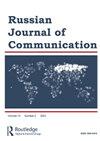The Iranian nuclear challenge as reflected in the Russian media
Q1 Social Sciences
引用次数: 0
Abstract
ABSTRACT The Middle East is one of the ‘unreliable links’ in the international security system. This became apparent once Iran began developing its nuclear program decades ago, and in recent years, the program has reinforced the challenges to international security. The steps taken by the UN and the International Atomic Energy Agency (IAEA) as well as US sanctions have not yet achieved positive results. Although Russia formally supported these sanctions, its political interests and attitude to Iran differ significantly from that of the United States and its allies. Russia seeks to consolidate its position in the region, challenging American policies. This article investigates political contradictions regarding the implementation of Iran’s nuclear strategy and observes the position of the Russian print media as a source of information. Despite the active development of online news in Russia, print media continue serving as a popular information source in the country. This holds especially true for local officials, who are responsible for making government decisions, thus determining our increased interest in these forms of media. The Russian press, when covering the ‘Iranian nuclear issue,’ do not serve as unbiased sources of information, but suggest propaganda influence, albeit flavored with thorough knowledge of the political situation.俄罗斯媒体反映的伊朗核挑战
中东是国际安全体系中“不可靠的环节”之一。几十年前伊朗开始发展核项目时,这一点就很明显。近年来,该项目加剧了对国际安全的挑战。联合国和国际原子能机构采取的措施以及美国的制裁尚未取得积极成果。尽管俄罗斯正式支持这些制裁,但其政治利益和对伊朗的态度与美国及其盟国有很大不同。俄罗斯试图巩固其在该地区的地位,挑战美国的政策。本文调查了有关伊朗核战略实施的政治矛盾,并观察了俄罗斯平面媒体作为信息来源的地位。尽管俄罗斯的网络新闻发展活跃,但纸媒仍然是该国受欢迎的信息来源。对地方官员来说尤其如此,他们负责政府决策,因此决定了我们对这些媒体形式的兴趣增加。俄罗斯媒体在报道“伊朗核问题”时,虽然对政治局势有充分的了解,但并不是公正的信息来源,而是具有宣传作用。
本文章由计算机程序翻译,如有差异,请以英文原文为准。
求助全文
约1分钟内获得全文
求助全文
来源期刊

Russian Journal of Communication
Social Sciences-Political Science and International Relations
自引率
0.00%
发文量
0
期刊介绍:
Russian Journal of Communication (RJC) is an international peer-reviewed academic publication devoted to studies of communication in, with, and about Russia and Russian-speaking communities around the world. RJC welcomes both humanistic and social scientific scholarly approaches to communication, which is broadly construed to include mediated information as well as face-to-face interactions. RJC seeks papers and book reviews on topics including philosophy of communication, traditional and new media, film, literature, rhetoric, journalism, information-communication technologies, cultural practices, organizational and group dynamics, interpersonal communication, communication in instructional contexts, advertising, public relations, political campaigns, legal proceedings, environmental and health matters, and communication policy.
 求助内容:
求助内容: 应助结果提醒方式:
应助结果提醒方式:


